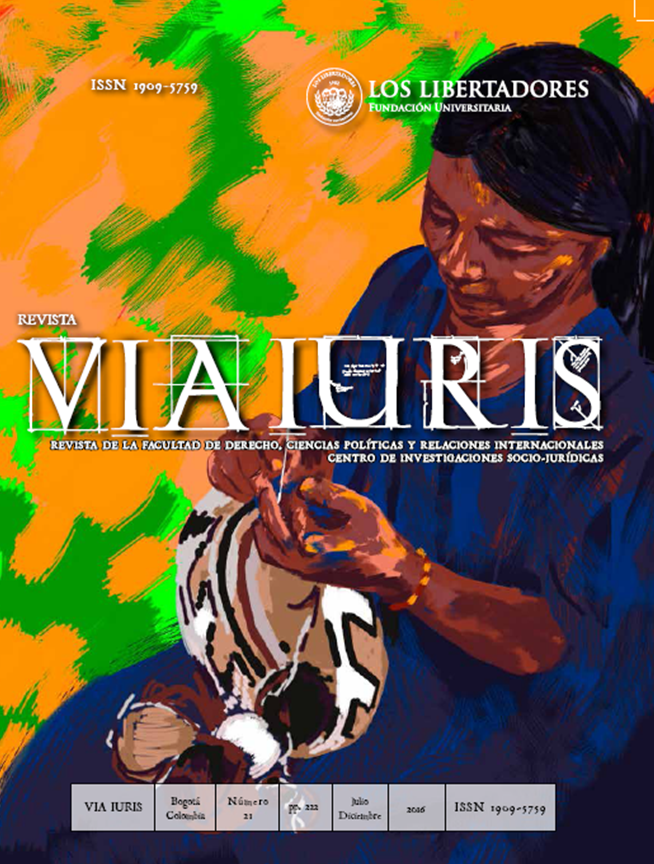Resumen
En el presente artículo se analiza el rol del defensor de derechos humanos en la caracterización de parresiasta, de acuerdo a la teoría foucaultiana, y a las condiciones críticas generadas por la denuncia de las graves violaciones a los derechos humanos que acontecen en la democracia colombiana. Esta problemática adquiere relevancia y pertinencia, al revisar el conflicto interno armado donde la incapacidad del Estado para proteger a quienes, como el defensor antes enunciado, dicen la verdad respecto a temas que crean escozor y desnudan la violencia que los aqueja, incluso por agentes del propio establecimiento institucional.
Así, el objetivo general de la investigación consistente en: analizar la labor de los defensores de derechos humanos desde la perspectiva foucaultiana del parresiasta, conforme las dinámicas del conflicto interno armado en Colombia. A su vez, se derivan tres objetivos específicos: 1) develar el concepto de parresiasta conforme la construcción epistémica formulada por Foucault; 2) identificar la función del defensor de derechos humanos en el marco del conflicto armado interno; 3) estudiar algunos casos relevantes en los cuales se advierta la relación del rol parresiasta del defensor de derechos humanos. La metodología aplicada es de corte cualitativo, con un enfoque hermenéutico interlineal aplicado al estudio de casos. Frente a los resultados y reflexiones, se hizo evidente que los postulados del Estado social de derecho, entre ellos, la justicia social y material, quedan sacrificados ante la cruenta realidad de una sociedad civil sacrificada por la inmaterializable condición de un Estado congruente, eficaz y soberano.
Referencias
Coordinación Colombia Europa Estados Unidos, CCEEU, Nodo Antioquia. (2014). Entre el sueño de la paz o la continunidad de la guerra. Recuperado el 10 de enero de 2016 de http://www.colectivodeabogados.org/IMG/pdf/informe-semestral-ddhh-antioquia-2014.pdf
Centro Nacional de Memoria Histórica. (2014). Informe ¡Basta Ya! Colombia; memorias de guerra y dignidad. Recuperado el 20 de enero de 2016 de http://www.centrodememoriahistorica.gov.co/descargas/informes2013/bastaYa/bastaya-colombia-memorias-de-guerra-y-dignidad-2015.pdf
Comisión Histórica del Conflicto y sus víctimas. (2015). Contribución al entendimiento del conflicto armado en Colombia. Recuperado el 16 de enero de 2016 de https://www.mesadeconversaciones.com.co/sites/default/files/Informe%20Comisi_n%20Hist_rica%20del%20Conflicto%20y%20sus%20V_ctimas.%20La%20Habana%2C%20Febrero%20de%202015.pdf
Corte Constitucional. (1998). Sentencia T590 de 1998. (M.P Alejandro Martinez Caballero; 20 de octubre de 1998).
Corte Constitucional. (2003). Sentencia T558 de 2003. (M.P. Clara Inés Vargas Hernández; 10 de julio de 2003).
Corte Constitucional. (2005). Sentencia 1062 de 2005. (M.P Marco Gerardo Monroy Cabra; 20 de octubre de 2005).
Echandía, D. (2002). Teoría general de la prueba judicial. Bogotá: Editorial Temis
Fernández, A., Manibardo, A. (2015). El concepto de parresía: verdad y libertad de palabra. Revista razón y palabra. Recuperado el 11 de febrero de 2015 de http://www.redalyc.org/pdf/1995/199543036049.pdf
Foucault, M. (2004). La hermenéutica del sujeto. Buenos Aires: Fondo de Cultura Económica.
Foucault, M. (2009). El gobierno de sí y de los otros. Buenos Aires: Fondo de Cultura Económica.
Foucault, M. (2010). El Coraje de la Verdad. Buenos Aires: Fondo de Cultura Económica.
García, M. (2007). El derecho como esperanza. En ¿Justicia para todos?. Sistema judicial, derechos sociales y democracia en Colombia. Bogotá: Norma.
Gómez de Pedro, M. (2001) El Estado del Bienestar. Presupuestos éticos y políticos. Tesis doctoral. Barcelona: Universidad de Barcelona, Facultad de Filosofía, Departamento de Filosofía Teorética I Práctica. Recuperado el 25 de enero de 2016 de htt://www.tdx.cesca.es/TESIS_UB/AVAILABLE/TDX-0425103-124025//TESISGPEDRO.pdf
Guzmán, G., Borda, F., & Umaña, E. (2010). La violencia en Colombia. Bogota: Punto de Lectura.
Jiménez, M. (2012). La importancia del accountabilitysocial para la consolidación de la democracia en América Latina. Revista de Relaciones Internacionales, Estrategia y Seguridad, 7(2), 97-130.
Méndez, G., & Sanín, R. (2012). La Constitución encriptada. Nuevas formas de emancipación global. Revista de derechos humanos y estudios sociales, IV(8).
Mendoza, B. (2001). Límites dogmáticos y políticos criminales de los delitos de peligro abstracto. Madrid: Editorial Comares.


